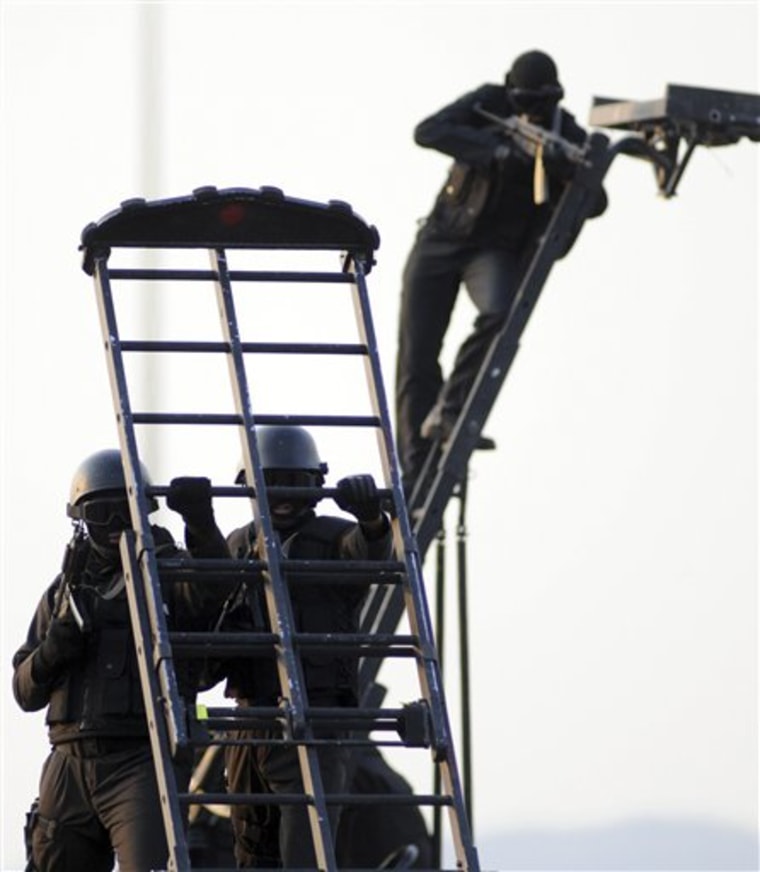Saudi Arabia deployed some 100,000 security personnel to keep order as Muslim pilgrims flooded into the holy city of Mecca in preparation for the annual hajj, beginning on Saturday.
Nearly 3 million pilgrims from around the world are expected to perform the hajj in Mecca and its nearby holy sites this year, according to Saudi authorities.
Every year sees a massive security deployment for the pilgrimage — mainly to manage traffic of the crowds, prevent friction and ensure safety.
Saudi Interior Minister Prince Nayef bin Abdul-Aziz said security forces had "no information" suggesting any threat of violence during the hajj.
"We must be ready and not rule out the occurrence of anything that might take us unawares," Saudi television quoted Nayef as saying Thursday after touring hajj facilities.
The hajj takes place just over a week after terror attacks in Mumbai, India's financial capital, in which suspected Islamic militants killed 171 and injured more than 300 others in assaults on upscale hotels, a restaurant and other sites across the city.
Last year, Saudi police arrested 28 militants who were allegedly planning to attack sites around the holy cities of Mecca and Medina during the hajj.
Interior Ministry spokesman Brig. Gen. Mansour al-Turki told The Associated Press there were no fears of any attacks this year. He said the security deployment was similar to last year's of 90,000.
Fear of fires, stampedes
The most pressing security concern during hajj is to prevent accidents like fires or stampedes that have killed hundreds in past pilgrimages as the millions of faithful move among holy sites over five days, staying in sprawling tent cities.
Saudi officials say they have set hundreds of thousands of fireproof tents in Mina, a site outside Mecca where pilgrims will camp for three days beginning Monday.
The government has banned cooking in tents, threatened fines for anyone using a gas stove, and butane gas cylinders will not be allowed at the holy sites. Caterers contracted by the Saudi government will use electric cookers to provide food.
Top security police chief, Gen. Saeed al-Qahtani, said in remarks published Thursday that pilgrims will not be allowed to use portable tents. Most pilgrims stay in official camps, but every year, hundreds of thousands of "unregistered pilgrims" squat on the streets in makeshift tents, complicating movement for the crowds. Saudi officials have tried with little success in the past to bar them.
"A special security unit has been established to prevent the use of portable tents," he was quoted as saying.
Hajj required
All able-bodied Muslims are required by their faith to perform the hajj at least once in their lives, if they can financially afford it, to cleanse their sins. Traveling to Mecca for the ceremonies of prayer and contemplation is a lifelong dream of many of the world's 1.3 billion Muslims.
It is also an annual test for Saudi Arabia's organizational skills, and the kingdom is constantly adapting infrastructure to avert tragedies that have marred past pilgrimages.
In 1990, 1,426 people were killed in a crush inside a tunnel leading to the holy sites. In 2006, 363 people died in a stampede at Mina as they passed through the Jamarat, a giant platform where pilgrims throw stones at three walls representing the devil.
This year, the platform has been expanded to four stories to avoid congestion.
More on Hajj | Saudi Arabia
